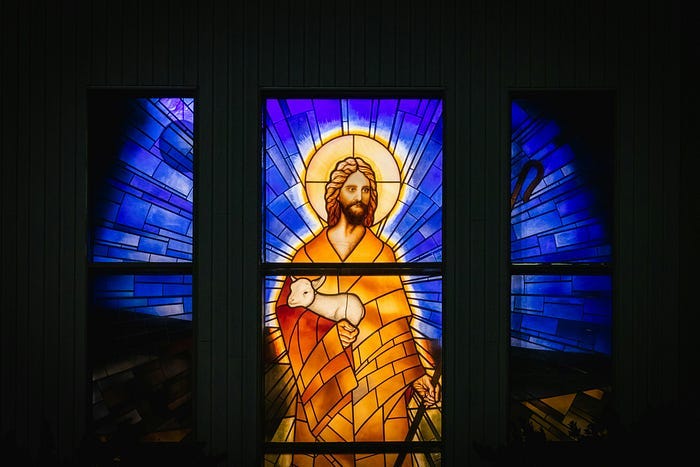
In John 20:17, Jesus calls the Father in Heaven “My Father” and “My God.”
Which sounds odd.
If Jesus is God, why does He refer to the Father in Heaven as His God?
Attacks against the Trinity often appeal to this verse. Some assert it as evidence that the idea of Jesus being God didn’t evolve for hundreds of years after the book of John was written.
If this was true, it would be devastating for Christianity.
What, then, does the evidence say? Does it point to Jesus being unaware of the Trinity, and unaware of being God?
Or does it point elsewhere?
Let’s look at the verse in question:
Jesus said to her, “Do not cling to me, for I have not yet ascended to the Father; but go to my brothers and say to them, ‘I am ascending to my Father and your Father, to my God and your God.’” (John 20:17, ESV)
The phrase “my Father and your Father” might sound odd to 21st-century ears. It’s not how we often talk.
Yet it fits perfectly with Trinitarian theology.
The theology of the Trinity summarizes what the Bible says about who God is. It states that God the Father and God the Son are the same God, but different Persons. Therefore, we shouldn’t be surprised to find Jesus talking about the Father independently from Himself. Jesus calling Him “My Father” doesn’t raise too many eyebrows, due to this.
It’s the phrase “my God and your God” that draws all the attacks.
Critics accuse Christian apologists of hand-waving it away, saying “Well, sure, Jesus said X, but what he really meant was Y.”
I respond back: No, Jesus meant exactly what He said.
The Father is both Jesus’ God and the disciples’ God.
As a Trinitarian, I’m completely comfortable with Jesus stating this. Why? Because ten short verses later, this happens:
Then Jesus said to Thomas, “Put your finger here, and see my hands; and put out your hand, and place it in my side. Do not disbelieve, but believe.”
Thomas answered him, “My Lord and my God!” (John 20:27–28, ESV)
This is the same book — the Gospel of John.
This is the same chapter of the same book.
And it declares that the Father is God and Jesus is God.
John uses the same word for both: Theos, God. He pairs the stories together to emphasize the comparison. In many Bibles, both verses are printed on the same page.
John couldn’t be more obvious. If the Father is God, as everyone agrees He is, then Jesus is also God.
John clearly establishes the Father first as Theos, letting his readers know with certainty who he is referring to with this word. Then he immediately proceeds to the story of Jesus appearing to the disciples, and then to Thomas, where Thomas calls Jesus the exact same word.
John wants you to understand: both Jesus and the Father are Theos — God.
They are not two separate Gods, but the same. After all, John made certain to include Jesus’ declaration: “I and the Father are one” (John 10:30, ESV).
Is this, then, a theology that needed hundreds of years to develop?
Of course not.
It’s present on the same page.
Jesus is the same God the Father is. They are both Theos, God. They are not two Gods, but one God, as Jesus and the Father are one.
Trinitarian theologians didn’t invent anything. They simply read the words on the page.


Hello Shamil, thanks for taking the time to respond. You said:
Hello Kyle. Why do Christians eat pork even though it is forbidden in the Bible? I guess the answer will be that Jesus allowed it, but Jesus came to fulfill the law, not to break it...”
My friend, you hit upon the answer yourself.
Jesus came to FULFILL the Law.
Not merely to FOLLOW the Law.
If all Jesus did was follow it, without fulfilling anything, then the Law would remain exactly the same after His appearance as before.
But because Jesus came to fulfill the Law, that means the Law’s application is going to change. The portions of the Law that Jesus fulfilled don’t need to be enforced slavishly anymore, because their purpose has been fulfilled.
Jesus fulfilled the sacrificial portion of the Law. We don’t need to sacrifice for every person, for every sin. Jesus was the “once and for all” sacrifice. His sacrifice is applied to everyone who believes in Him, so that portion of the Law has been fulfilled.
Likewise, there are portions of the Law that relate to the unique cultural identity of the nation of Israel. These laws set Israel apart, so the surrounding nations would always know who is an Israelite. These included the laws about which kinds of clothing to wear and what kinds of foods to avoid eating. This was because the message of God was coming to the world through Israel. Israel had to be set apart, to be distinct.
But Jesus’ fulfillment of the Law meant that the dividing line between Jew and Gentile was removed. Gentiles could enter the Kingdom of God without first becoming Jews.
Because of this, those laws about fabrics and foods are no longer in force. Their purpose was fully served. They were fulfilled, and are now done.
Note that Jesus didn’t REMOVE any of the Law. Jesus never negated it or said it was wrong.
Rather, Jesus FULFILLED the Law. Every part of it was good and served its purpose. A fulfilled law is a good law that is completed, not a bad law that was negated.
Jesus went to heaven and sat on the right side of the throne. He didn’t sit on the throne. Stephen saw that before he was killed. God, Lord Jesus the only begotten Son of God and the Holy Spirit are 3 different persons. Only the Father knows the exact time His Son will return to Earth.
We do not know the truth